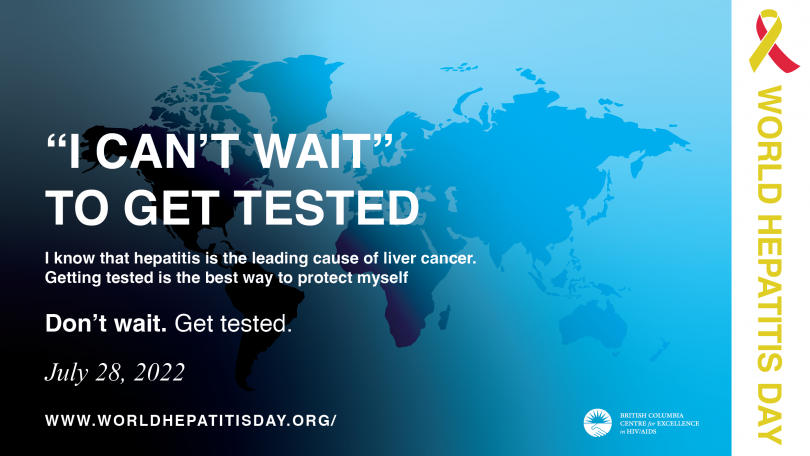Today is World Hepatitis Day, an annual opportunity to raise awareness of the global burden of viral hepatitis, a liver inflammation, and to spark action. This year’s theme is ‘I Can’t Wait’, which highlights the urgency from the global community to improve access to life-saving treatments.
Recent estimates by the World Health Organization (WHO) say 58 million people are chronically infected with HCV while 290,000 die annually from HCV-related liver diseases. In Canada, HCV affects 250,000 people, of which over 40 percent are unaware of their infection.
Around the world, every 30 seconds someone dies from a hepatitis-related illness, despite the fact that the hepatitis C virus (HCV) is now generally considered a curable disease. Relatively new and well-tolerated direct-acting antivirals (DAAs) have a cure rate of 95 per cent. However, there are still significant barriers to treatment for those in need.
The BC Centre for Excellence in HIV-AIDS at St. Paul’s Hospital is raising awareness of HCV and its treatment in several ways. Each follows the Treatment as Prevention® (TasP®) strategy pioneered by the BC-CfE and proven repeatedly to be effective. TasP® is based on the concept that early access to testing and immediate, sustained access to treatment improves quality of life and longevity, while curbing transmission.
Pilot project provides links to care for underserved DTES clients
Dr. Kate Salters leads the BC-CfE’s Viral Hepatitis Research Program (VHRP). Its goal is to improve health outcomes and optimize health service delivery in BC for individuals impacted by, and most at risk for, HCV. The work focuses on the overlaps between HCV, HIV, and mental-health and substance-use disorders.

The BC-CfE’s most recent effort towards combatting HCV in BC is Hep C Connect. This pilot project, funded by Gilead Sciences, was launched in November 2021 to provide nurse-led, low barrier HCV testing, education, and links to care to clients of the Hope to Health (H2H) supervised consumption site located in Vancouver’s Downtown Eastside (DTES) at 611 Powell Street.
Integrating HCV services, education and harm reduction
While testing for HCV is a large part of Hep C Connect, the main aim of the project is to enhance linkage to care and retention amongst unattached and underserved clients diagnosed with HCV in the DTES. Clients are offered rapid antibody testing and same-day, in-house, confirmatory HCV RNA testing for clients who receive reactive antibody results. A licensed practical nurse provides pre- and post-test counselling, as well as follow-up and links to care. Hep C Connect provides a unique integration of HCV related services, low-barrier HCV education, community-based harm reduction services. An ability to receive antibody and in house, same-day diagnostic testing means that clients face fewer barriers which often discourage people, especially those living in the DTES, from accessing lifesaving HCV treatment.
Ensuring we Per-SVR with HCV care
The BC-CfE also runs the Per-SVR study. Per-SVR, which stands for PrEseRvation of Sustained Virologic Response, was launched to evaluate HCV client care experiences in the greater Vancouver area. The study also aims to better understand how HCV reinfections may occur amongst those with limited access to point-of-care treatment. Per-SVR examines these questions while helping link clients to long term care with the help of physicians, nurses, clinical researchers and peer research associates who are all dedicated to providing community-centred health care.

For World Hepatitis Day, the VHRP team is strengthening bonds with the DTES community and raising awareness about HCV testing, treatment, and the services offered at H2H, by providing hot dogs, refreshments, and educational materials.
Also today, Drs. Salters and Mark Hull, a BC-CfE Research Scientist, are co-presenting a webinar titled, “Innovations in Hepatitis C care and treatment to end the epidemic.”
While today is a good day to celebrate the significant progress made towards eradicating HCV, it is also an opportunity to increase awareness and continue to work towards barrier-free testing, prevention, and treatment.





